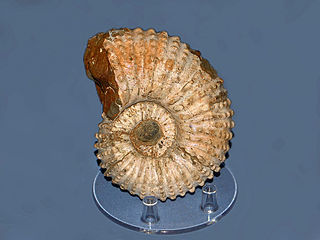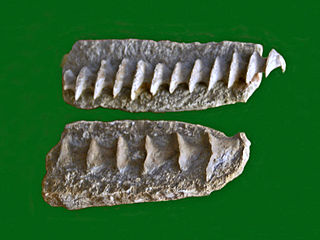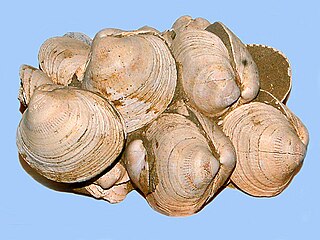
Goniatites is a genus of extinct cephalopods belonging to the family Goniatitidae, included in the superfamily Goniatitaceae. Hibernicoceras and Hypergoniatites are among related genera.
Joseph John Sepkoski Jr. was a University of Chicago paleontologist. Sepkoski studied the fossil record and the diversity of life on Earth. Sepkoski and David Raup contributed to the knowledge of extinction events. They suggested that the extinction of dinosaurs 66 mya was part of a cycle of mass extinctions that may have occurred every 26 million years.

Caturus is an extinct genus of fishes in the family Caturidae. Fossils of this genus range from 200 to 109 mya.

Ancyloceras is an extinct genus of heteromorph ammonites found throughout the world during the Lower Cretaceous, from the Lower Barremian epoch until the genus extinction during the Lower Aptian.

Zaniolepis is a genus of scorpaeniform fish native to the eastern Pacific Ocean. Z. frenata that was a source of food to the Native American inhabitants of San Nicolas Island off the coast of southern California, United States during the Middle Holocene.

Douvilleiceras is a genus of ammonites from the Middle to Late Cretaceous. Its fossils have been found worldwide, in Africa, Asia, Europe, and North and South America.

Phylloceras is an extinct genus of ammonoid cephalopods belonging to the family Phylloceratidae. These nektonic carnivores lived from Early Jurassic to Late Cretaceous.

Archimedes is a genus of bryozoans belonging to the family Fenestellidae. The first use of the term "Archimedes" in relation to this genus was in 1838.

Tarasiiformes is an extinct order of prehistoric ray-finned fish.

Macroscaphites is an extinct cephalopod genus included in the Ammonoidea that lived during the Barremian and Aptian stages of the Early Cretaceous. Its fossils have been found throughout most of Europe and North Africa.

Pachydesmoceras is a genus of ammonites belonging to the family Desmoceratidae.

Ampullina is an extinct taxonomic genus of deep-water sea snails, marine gastropod molluscs in the clade Caenogastropoda. These sea snails were epifaunal grazers. They lived from the Middle Triassic period to the Lower Pliocene age.

Ampullinopsis is an extinct taxonomic genus of deep-water sea snails, marine gastropod molluscs in the clade Sorbeoconcha. These sea snails were epifaunal grazers. Sea snails of this genus lived from Paleocene epoch to Miocene epoch.

Lopha is a genus of marine bivalve molluscs in the family Ostreidae.

Glycymeris, common name the bittersweet clams, is a genus of saltwater clams, marine bivalve molluscs in the family Glycymerididae.

Holopea is an extinct genus of fossil sea snails, Paleozoic gastropod mollusks in the family Holopeidae.

Clypeaster, common name "cake urchins" or "sea biscuits", is a genus of echinoderms belonging to the family Clypeasteridae.

Pterotrigonia is an extinct genus of saltwater clams, marine bivalve molluscs in the family Megatrigoniidae. This genus is known in the fossil record from the Jurassic period Tithonian age to the Cretaceous period Maastrichtian age. Species in this genus were facultatively mobile infaunal suspension feeders. The type species of the genus is Pterotrigonia cristata.

Parkinsonia is a genus of ammonites belonging to the family Parkinsoniidae.

Eotetragonites is an extinct genus of ammonite.



















